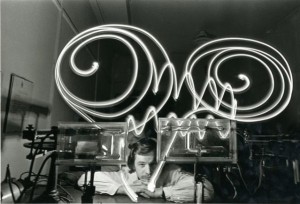Bergen Assembly 2013
Monday Begins on Saturday
31 August–27 October 2013
Preview: 29–30 August 2013
Symposium: 31 August–1 September 2013
Curators: Ekaterina Degot and David Riff
“In the premises of the Department of Absolute Knowledge all the small upper windows were open, because the smell of Professor Vybegallo’s herring heads was seeping in. There was snow heaped up on the windowsills and there were dark puddles under the radiators of the steam central heating system. I closed the windows and walked between the virginally clean desks of the department’s staff members. Standing on the desks were brand-new ink sets that had never seen ink, but there were cigarette butts spilling out of the inkwells. This was a strange department. Its motto was: ‘The cognition of infinity requires an infinite amount of time.’ I could hardly dispute that assertion, but the staff drew an unexpected conclusion from it: ‘And therefore it makes no difference whether you work or not.'”
(Arkady and Boris Strugatsky, Monday Begins on Saturday, 1964. Translated from Russian by Andrew Bromfield, London: Seagull Publishing House, 2005).
The Department of Absolute Truth is but one of many departments of a magical research institute in Monday Begins on Saturday, a Soviet fantasy novel by Arkady and Boris Strugatsky. It tells the story of a programmer who gets sidetracked while vacationing in the northern region of Karelia, and winds up joining the staff of the Research Institute for Wizardry and Sorcery, where a motley bunch of eager researchers, bureaucrats, demagogues, and fairytale beings are all searching for ways to achieve human happiness. Some work day and night, hence the title of the novel. Others do nothing, like those in the Department of Absolute Knowledge, and their laziness is punished by a magical curse that leads to a profuse growth of hair on their ears.
The first edition of the Bergen Assembly is a contemporary rewriting of the Strugatsky novel, conceived as an archipelago of fictitious research institutes. It delves into the idea that paradoxically, contemporary art is the place where the dialectical materialist magic of Monday Begins on Saturday has its afterlife, albeit as a potential accomplice to the real ravages of fictitious capital and as a victim of rampant precarization and austerity. Spread over multiple venues in Bergen, the exhibition gathers works that are themselves the outcome of critical-imaginative research into the heightened contradictions and particular injustices of our time. Ours is an age of animal uprisings and imaginary nations of vagabond cats, soy republics, seed vaults, and human zoos—a fluid world under constant surveillance. The future is disappearing, a dream from the past, once a function of love and the lack thereof, now the domain of the ultra-rich. Everything turns to air and water, except those strange footprints in stone.
Contributing artists and researchers include:
- Aeron Bergman & Alejandra Salinas
- Christian von Borries
- Olga Chernysheva
- Chto Delat
- Keti Chukhrov
- Carlfriedrich Claus
- Lars Cuzner & Fadlabi
- Josef Dabernig
- Stephan Dillemuth
- Dora García
- Pedro Gómez-Egaña
- Boris Groys
- Inti Guerrero
- Ane Hjort Guttu
- Dmitry Gutov
- Jan Peter Hammer
- IRWIN
- Kiluanji Kia Henda
- Yuri Leiderman & Andrey Silvestrov
- Jumana Manna & Sille Storihle
- Ivan Melnychuk & Oleksandr Burlaka—Grupa Predmetiv
- Eduardo Molinari—Archivo Caminante (in collaboration with Azul Blaseotto, Ana Broccoli, Ala Plástica, Hernán Cardinale)
- Anna Oppermann
- Uriel Orlow
- Our Literal Speed
- Pavel Pepperstein
- Aleksandr Rodchenko
- Roee Rosen
- Ada Rybachuk &Volodymyr Melnychenko
- Renata Salecl
- Konstanze Schmitt
- Benedict Seymour
- Andreas Siekmann & Alice Creischer
- Maxim Spivakov
- Imogen Stidworthy
- Władisław Strzemiński
- Pelin Tan & Anton Vidokle
- Mariusz Tarkawian
- Minze Tummescheit & Arne Hector—cinéma copains
- Urban Fauna Laboratory
- Dimitri Venkov (in collaboration with Antonina Baever)
- Jan Verwoert
- Clemens von Wedemeyer
- Wong Men Hoi
Photo: Anatoly Khrupov, Vilnius State University physics lab, 1960s.
© The Lumiere Brothers Center for Photography, Moscow.


